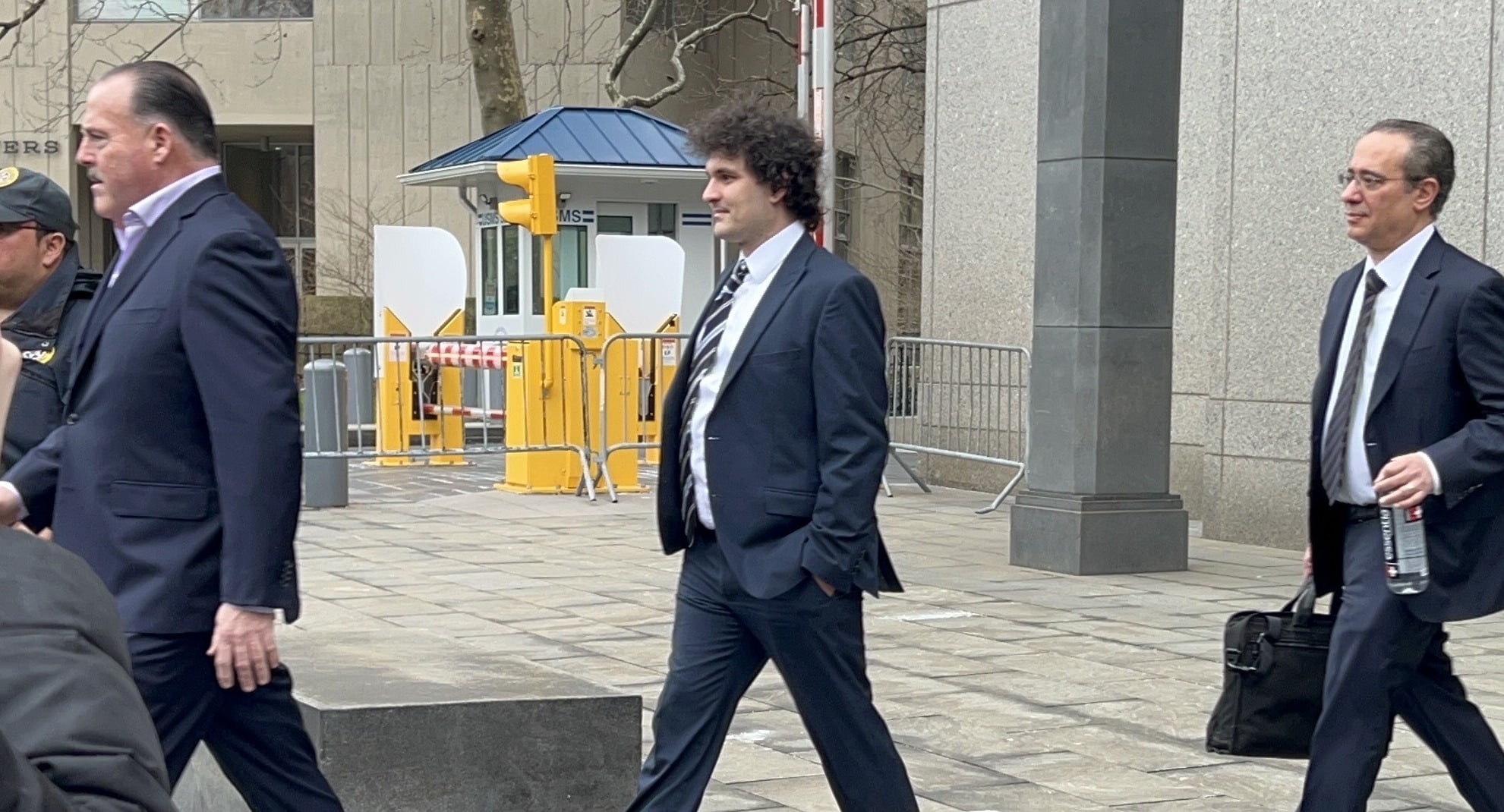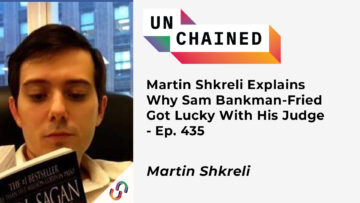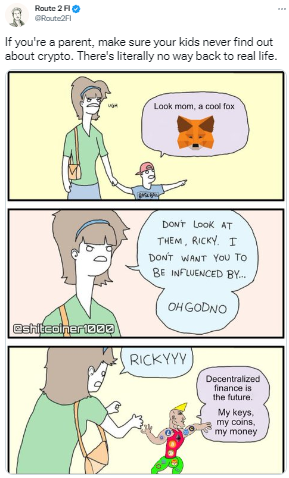
Posted October 4, 2023 at 6:48 pm EST.
Unchained is pleased to announce that David Z. Morris will be writing a regular opinion column at Unchained, starting with some pieces analyzing the run-up to the trial of Sam Bankman-Fried. Morris has been writing about cryptocurrency since 2013 for outlets including Fortune, the Atlantic, and, most recently, as Chief Columnist at CoinDesk. He publishes the biweekly finance and technology newsletter Flesh/Markets.
__________________________________________________________________________
All eyes are on the criminal trial of Sam Bankman-Fried, the founder and mastermind behind the crypto exchange FTX and trading firm Alameda Research, which began Tuesday. Both businesses are now defunct thanks to what appears to be, at best, Bankman-Fried’s incompetence at managing customer funds. At worst, it may have been the largest financial fraud since Bernie Madoff.
But it has become increasingly obvious since his arrest last December that the image of Sam Bankman-Fried, once hailed as crypto’s “golden boy,” was created with a lot of help from people other than Bankman-Fried himself. Those people largely came from the global elite, and appear to have used their status to help take advantage of vast numbers of average people.
They won’t be sitting at the defense table during the trial – but many of them should be.
Supporting cast
Perhaps most shockingly, we recently learned that Bankman-Fried’s Stanford professor parents appear to have had an active role in their son’s alleged crimes, including emails that appear to show his mother, Barbara Fried, encouraging campaign finance fraud. Given their prominence at the institution, Stanford’s role in propping up FTX at its peak has been called into question. In court filings earlier this year, the university was listed among creditors FTX owed money.
There are many others who seem to have been blinded by greed in the face of a fake genius’s illusory wealth. Since Bankman-Fried’s arrest, we have also learned of more direct involvement by the leaders of the effective altruism movement in covering up his misdeeds. We have heard mealy-mouthed defenses from Kevin O’Leary, the reality show investor, who was reportedly paid $15 million dollars to shill the exchange.
And finally, we’ve learned of the immense failings of real-life professional investors. Venture capital funds seemingly swallowed SBF’s mythology whole and did little of the deep number-crunching or oversight that are nominally their main roles in the economy. Most notoriously, Sequoia Capital invested without looking too closely, praised SBF’s “brilliance” to the sky, and then tried to erase their alternate-reality hagiography.
None of these entanglements exculpate Sam Bankman-Fried. A defense that leans on his youth and inexperience to explain the embezzlement of billions of dollars of other people’s money won’t erase that as CEO of FTX, he was the one ultimately responsible for the company’s misconduct. It was he, above all, who built an organization so chaotic and a team so short on experience, that his own reckless behavior went unchecked.
The hoax of hype
But SBF also represents a deeper rot endemic in the shift of the global economy away from productive industry and towards finance. This shift makes it easier for elites to abuse their influence for the purpose of taking advantage of the rest of us.
Finance had the highest share of U.S. GDP growth of any industry in 2022 at 20.2% (professional services was a distant second at 13.1%). And as I’ve written elsewhere, finance is about predicting the future. Moreso, it’s about bringing future profits into the present, and it’s subject to large misjudgments. Those misjudgments are often hard to distinguish from legalized fraud, and it’s the already wealthy and connected who stand to benefit most from that slippery boundary.
For an example of the seemingly innocent sort, just look at a “pandemic stock” like Peloton: for a moment, the future seemed to be all about people staying at home and riding stationary bikes. That led Peloton’s market cap to rise about 7x to nearly $46 billion in a few weeks in early 2020. A lot of people got very rich by selling into anticipation of projected success. Peloton’s massive explosion quickly faded, and its market cap has since dropped by 97%. It now trades at about $1.8 billion in total market cap.
The narrative around Peloton was largely shaped by extremely fast-moving, unpredictable events in the real world. But in other cases, influential public figures profited from actively building narratives of a specific bright future.
The most notorious example is probably the series of “SPACs,” or Special Purpose Acquisition Companies, launched during the pandemic by financier Chamath Palihapitiya. SPACs have fewer disclosure requirements than traditional IPOs (which I warned about at the time). That dearth of actual numbers left Palihapitiya and his allies free to craft narratives around companies like Clover Health that turned out to have little relationship to reality. His SPACs have collectively lost investors billions in just a few years – but Palihapatiya himself walked away from the arena a richer man thanks in part to fees on the deals.
Those involved in various degrees in the collapse of FTX were clearly eager to replicate patterns by generating hype before actual results justified it. While obviously, I agree with the idea that crypto is going to be very important across sectors, the hype and influence deployed to center that potential in FTX itself was, like the hype around Peloton and Clover and many other companies, unjustified.
But here’s the very dangerous, intractable problem of elite corruption in finance: quite often, following what figures like this do is actually smart investing. That’s not because they’re right all that often, but because of another thing we’ve learned since Sam Bankman-Fried’s arrest: The elite move in herds for safety. They watch each other’s backs, at the very highest level – including in the media.
Good press, bad practice
Mainstream press like The New York Times failed badly in the immediate wake of FTX’s collapse, often seeming to credulously repeat Bankman-Fried’s self-aggrandizing claims. But let’s pretend that’s forgivable, given fast-moving events and the confusion factor of crypto’s role in events.
What’s not forgivable is to see the same mistakes made now, nearly a year later. What’s not forgivable is author Michael Lewis going on “60 Minutes” on Sunday and saying that FTX “actually had a great real business. If no one had ever cast aspersions on the business, if there hadn’t been a run on customer deposits, they’d still be sitting there making tons of money.” He has even gone to the length of calling what happened a “bank run,” a provably false characterization.
Lewis is a long-respected financial journalist, but these statements aren’t just untrue – they downplay the seriousness of the harm that was done. FTX used customer funds so freely and kept such poor financial records that it’s impossible to know if it was actually profitable, much less “a great real business.” Lewis’ statements imply that his mere proximity to Bankman-Fried, proximity afforded by Lewis’ stature, left him vulnerable to the CEO’s strange seduction.
Similarly, just last week, we saw a troubling New Yorker piece about Bankman-Fried’s parents. This is, again, work by a respected financial journalist and former Wall Streeter, Sheelah Kolhatkar, in the pages of a publication that speaks to and about the most powerful people in the world. Kolhatkar’s reporting captures some of the derangement that seems to be wracking the Bankman-Fried’s parents as they try to convince themselves of their precious boy’s innocence. But the piece also omits, mischaracterizes, or downplays much key and well-known evidence of both SBF’s guilt and the complicity of others, including omitting allegations of complicity against effective altruism leaders like William MacAskill.
To be clear, none of this speaks to what anyone could call a conspiracy as such. I’m not claiming that affiliated outsiders like Kevin O’Leary were explicitly “in on the con” – though some of them, as we’ve found with Bankman-Fried’s parents, may have been more involved than we know.
But it’s more disturbing that all of this behavior seems to have come so naturally to everyone involved. In the case of certain journalists, there wasn’t even the promise of some corrupt payout, just the well-trained habit of apologizing for people seen as powerful and important.
Financial hype and plausible deniability have become the hallmarks of the corrupt elites of late capitalism. Sending one man-child to prison for a few decades won’t change that.
But it’s a start.
Read more: New Suit Claims That FTX Kept Its Fraud All in the Family- SEO Powered Content & PR Distribution. Get Amplified Today.
- PlatoData.Network Vertical Generative Ai. Empower Yourself. Access Here.
- PlatoAiStream. Web3 Intelligence. Knowledge Amplified. Access Here.
- PlatoESG. Carbon, CleanTech, Energy, Environment, Solar, Waste Management. Access Here.
- PlatoHealth. Biotech and Clinical Trials Intelligence. Access Here.
- Source: https://unchainedcrypto.com/in-the-sbf-case-elite-corruption-is-whats-really-on-trial/
- :has
- :is
- :not
- $UP
- 13
- 2%
- 20
- 2013
- 2020
- 2022
- 2023
- 8
- a
- About
- above
- abuse
- acquisition
- across
- active
- actively
- actual
- actually
- ADvantage
- Affiliated
- afforded
- again
- against
- Alameda
- ALAMEDA RESEARCH
- All
- Allegations
- alleged
- already
- also
- among
- an
- analyzing
- and
- Announce
- Another
- anticipation
- any
- anyone
- appear
- appears
- ARE
- around
- arrest
- AS
- At
- author
- average
- away
- backs
- Bad
- Bankman-Fried
- BE
- because
- become
- been
- before
- began
- behind
- benefit
- BEST
- Billion
- billions
- Bloomberg
- both
- Bright
- Bringing
- Building
- built
- business
- businesses
- but
- by
- call
- calling
- came
- Campaign
- cap
- capital
- capitalism
- captures
- case
- cases
- Center
- ceo
- certain
- Chamath Palihapitiya
- change
- chief
- claiming
- claims
- clear
- clearly
- closely
- CNBC
- Coindesk
- Collapse
- Column
- come
- Companies
- Company’s
- complicity
- confusion
- connected
- Conspiracy
- convince
- corrupt
- Corruption
- could
- Court
- Court Filings
- covering
- craft
- created
- CrunchBase
- crypto
- crypto exchange
- Crypto exchange FTX
- cryptocurrency
- customer
- Dangerous
- David
- Deals
- decades
- December
- deep
- deeper
- Defense
- defunct
- deployed
- deposits
- DID
- disclosure
- Distant
- distinguish
- do
- dollars
- done
- dropped
- during
- each
- eager
- Earlier
- Early
- easier
- economy
- Effective
- elite
- elsewhere
- emails
- endemic
- Even
- events
- EVER
- everyone
- evidence
- example
- exchange
- experience
- Explain
- explosion
- extremely
- Eyes
- Face
- factor
- fake
- false
- fast-moving
- Fees
- few
- fewer
- Figures
- filings
- Finally
- finance
- financial
- financial fraud
- Financial Journalist
- Firm
- following
- For
- Former
- Fortune
- found
- founder
- fraud
- Free
- from
- FTX
- funds
- future
- GDP
- generating
- given
- Global
- Global economy
- going
- gone
- got
- great
- Greed
- had
- hallmarks
- happened
- Hard
- harm
- Have
- he
- Health
- help
- highest
- him
- his
- Home
- HTML
- http
- HTTPS
- Hype
- i
- idea
- if
- image
- immediate
- immense
- important
- impossible
- in
- In other
- Including
- incompetence
- increasingly
- industry
- influence
- Influential
- innocent
- Institution
- into
- invested
- investing
- investor
- Investors
- involved
- involvement
- IPOs
- IT
- ITS
- itself
- journalist
- Journalists
- jpg
- just
- kept
- Key
- Know
- large
- largely
- largest
- Last
- Late
- later
- launched
- leaders
- learned
- Led
- left
- legalized
- Length
- less
- Level
- Lewis
- like
- Listed
- little
- Look
- looking
- lost
- Lot
- made
- Main
- MAKES
- Making
- man
- managing
- many
- Market
- Market Cap
- massive
- May..
- Media
- mere
- Michael
- Michael Lewis
- million
- mistakes
- moment
- money
- more
- most
- mother
- move
- movement
- much
- NARRATIVE
- narratives
- nearly
- New
- New York
- New York Times
- Newsletter
- no
- None
- notorious
- now
- numbers
- obvious
- october
- of
- often
- on
- once
- ONE
- Opinion
- or
- organization
- Other
- Others
- out
- Outlets
- Oversight
- owed
- own
- pages
- pandemic
- parents
- part
- patterns
- Peak
- peloton
- People
- people’s
- piece
- pieces
- plato
- Plato Data Intelligence
- PlatoData
- plausible
- pm
- poor
- posted
- potential
- powerful
- Praised
- Precious
- predicting
- present
- press
- prison
- probably
- Problem
- productive
- professional
- Professor
- profitable
- profited
- profits
- projected
- prominence
- promise
- public
- Publication
- Publishes
- purpose
- quickly
- real
- real world
- Reality
- really
- recently
- reckless
- records
- regular
- relationship
- reportedly
- Reporting
- represents
- Requirements
- research
- respected
- responsible
- REST
- Results
- Rich
- riding
- right
- Rise
- Role
- roles
- Run
- s
- Safety
- Sam
- Sam Bankman-Fried
- same
- saw
- saying
- sbf
- SBF’s
- Second
- Sectors
- see
- seem
- seemed
- seems
- seen
- Selling
- sending
- Sequoia
- Sequoia Capital
- Series
- Services
- shaped
- Share
- shift
- Short
- should
- show
- since
- Sitting
- sky
- smart
- So
- some
- SPACs
- Speaks
- special
- specific
- stand
- stanford
- start
- Starting
- statements
- Status
- staying
- Still
- strange
- subject
- success
- such
- Suit
- sunday
- table
- Take
- taking
- team
- Technology
- than
- thanks
- that
- The
- The Future
- The New York Times
- the world
- their
- Them
- themselves
- then
- There.
- These
- they
- thing
- this
- this year
- those
- though?
- times
- to
- tons
- too
- Total
- Total Market Cap
- towards
- trades
- Trading
- traditional
- trial
- tried
- troubling
- try
- Tuesday
- Turned
- u.s.
- Ultimately
- Unchained
- university
- unpredictable
- us
- used
- various
- Vast
- venture
- venture capital
- very
- Vulnerable
- Wake
- Wall
- was
- Watch
- we
- Wealth
- wealthy
- week
- Weeks
- well-known
- went
- were
- What
- which
- while
- WHO
- whole
- will
- with
- without
- Work
- world
- Worst
- writing
- written
- WSJ
- Yahoo
- year
- years
- york
- youth
- zephyrnet











